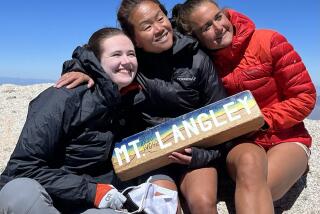Kildow Driven by Unshaken Spirit
- Share via
San Sicario Fraiteve, Italy — Listen to the mother, then listen to the daughter, and you’ll discover what separates Olympians from everyone else, including those who share their DNA strands.
The mother calls her daughter “a tough kid.”
The daughter calls herself “an idiot.”
The mother uses the word “amazing.”
The daughter uses the word “disappointing.”
Olympians aren’t ungrateful. They appreciate all that they’ve been given. They just aren’t satisfied. They don’t count blessings, they count reps.
To anyone who saw Lindsey Kildow’s “Wide World of Sports”-worthy crash during a downhill training run Monday, the sight of her in the start house Wednesday was heartwarming enough, and watching her stay upright for the next 3,058 meters felt like a victory in itself.
“I’m just so happy she finished,” said Linda Krohn, Kildow’s mother. “It was tentative, but knowing what she went through, I think it was a good finish. She skied really well, I thought.”
Sure, Kildow knew what she was attempting, figured people would use words like “inspiring” to describe it. She wasn’t thinking about words. Her world is measured by numbers. She had to worry about a clock -- and clocks don’t care what happened to you Monday.
It was the competitor in her that brought her to this Italian mountaintop in the first place, the competitor that got her out of the hospital bed and up the ski lift for Wednesday’s race.
And it was the competitor in her that showed in her anguished expression at the finish line, when she looked up and saw that her time of 1 minute 57.78 seconds would not be low enough to get her on the medal stand. She wound up eighth in the race won by Austria’s Michaela Dorfmeister.
“It’s still disappointing because I’m not physically where I want to be and I feel like I could have done a lot better,” Kildow said. “But for what I’ve been through, I’m just happy to be here and I thank God for keeping me healthy -- or healthy enough to race.”
But there’s something nagging her because she knows she wasn’t quite healthy enough to win. And that’s what she was here to do.
Kildow was traveling Monday across a section of the downhill course known as “the rolls” when she lost control of her left ski and was launched into the air, landing on her back, spinning and sliding to a heart-stopping halt.
“I just remember being in my tuck and going over the roll, and then all of a sudden I’m looking back up the hill over the same roll that I’d just gone over,” Kildow said. “Then I lost memory for about 10 minutes. I just remember screaming and my back being in a lot of pain.”
Once she got over the injuries, “I was just bummed, you know? That’s the last thing you want to have happen right before the Olympics, especially because I felt like I was skiing well. It’s more of the frustration and anger toward myself for being an idiot.”
The Olympic mentality is that if the mind can overcome anything, bad things come from mental mistakes. Not simply a rough patch, or a demanding course that sent two other skiers to the hospital in training and took five skiers out of the race Wednesday.
And don’t think Kildow doesn’t care about winning because she once accepted a cow instead of cash for winning a race. The point was, she made the choice after she’d won. Great sports memories are made by people who are as obsessed with winning as Kildow, who need it like a fire needs oxygen.
Poor Krohn was traveling to Europe when Kildow crashed. She was out of BlackBerry range until she got to her lodging in Briancon, France, just across the French-Italian border. When she checked in with Lisa Wilkinson, the women’s team manager, Wilkinson reported that Kildow had maintained consciousness ... then had to explain why that was newsworthy. They picked up Krohn and brought her to Kildow’s hospital room in Turin.
“She was really in good spirits,” Krohn said. “She was OK, and that was such a relief.”
She didn’t try to talk her daughter out of racing. As far as she was concerned, the doctor said it was OK, so it was Kildow’s decision.
You get the feeling Kildow didn’t have a choice. She had already missed a world championship in 2004 because she was injured in a crash, and had to sit out the world junior championship in 2001 because of another crash. So even though her back’s flexibility is limited, she hit the slope Wednesday and plans to be there Friday for her next event, the combined.
“I’m going to go for it,” Kildow said. “I’ve got to see how it feels. Slalom’s going to be, um, interesting. But like I did today, I’m just going to do whatever I can to be there.”
All of the skiing stuff comes from her father, Alan, a three-time U.S. junior ski champion. The childhood stories Krohn told involved her daughter’s demanding to have “Cinderella” read to her every night and correcting any missed words, or dressing up with a friend like the characters in “Cats” and performing to the soundtrack.
Now Kildow isn’t speaking to her father, reportedly because he criticized her relationship with skier Thomas Vonn.
So it’s her mother who was there to provide support, making up with a parent’s love what she couldn’t provide by way of instruction or even comprehension.
“I don’t understand how you could keep racing after you crash that badly,” Krohn said.
“I couldn’t do that. I’m just in awe of her, what she’s doing.”
Kildow wants more than her mother’s respect.
“It’s the Olympics,” Kildow said. “You have to expect the best or hope for the best. That’s what I was hoping for, hopefully a top three. But top 10’s still good. I’m not complaining about that whatsoever.”
Going from the hospital bed to an eighth-place finish is admirable, but it’s Kildow’s desire for more that makes me admire her.
More to Read
Go beyond the scoreboard
Get the latest on L.A.'s teams in the daily Sports Report newsletter.
You may occasionally receive promotional content from the Los Angeles Times.






